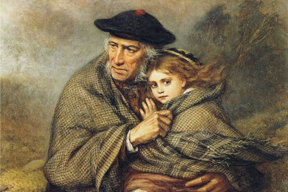A Message for Jack and Owen
|
Jack and Owen, I do not often eulogize a person with whom I have serious political and ethical issues. Rudyard Kipling is such a person. He was the model of what British imperialism was. He was born in India at the time of the end of the American Civil War and died just before WWII. By the end of WWII, the ability of the British to be imperialists and racists finally died. That is not to say that some were still into imperialism. Nonetheless, the war exhausted their empire, which totally crumbled.
Having acknowledged my issues with Kipling's imperialistic mindset, Jack and Owen, allow me to give that writer the credit that he is due especially for his poem, If—.
Kipling's If— was published in 1895 as his tribute to a Scottish explorer and colonial leader in South Africa, Dr. Leander Starr Jameson. Jameson followed orders to attack the Boers in the Transvaal. The famous Jameson Raid took place in 1895. However, Joseph Chamberlain, the British Colonial Secretary, who was the father of Neville Chamberlain, imprisoned Jameson when he failed to defeat the Boers. At that time, what is called today South Africa was four different areas of control: the British controlled the Cape Colony and Natal. The Boers called their areas, the Orange Free State and Transvaal. What Kipling did was to write a tribute to Jameson for following orders in spite of the consequences that he faced by the colonial government. Additionally, Kipling wrote this poem in the form of advice that he wanted to convey to his son, John. Tragically, John Kipling died several years later at the Battle of Loos in 1915 during WWI. John Kipling's death was less than a year before Alan Seeger died at Belloy-en-Santerre on July 4, 1916. Therefore, I am writing this essay for both of you, Jack and Owen. This next picture is of Jameson, for which If— was Kipling's tribute. I know; it is not in color, but it was taken about a century ago, which was thirty years before I was born.
Jack and Owen, what both intrigues and concerns me is that Kipling was not able to see the contradiction of being critical of British colonial rule and how that affected Jameson while at the same time what Jameson did was British imperialism also. Kipling did not recognize it while in South Africa nor his years in India and Burma. He was upset with Jameson being hurt by imperialism while Jameson was doing the same thing to others. It is like getting mad when your brother hits you, and then you hit him back. Finally, Khushwant Singh, who was a lawyer and writer in India, said of Kipling's If— that it was "the essence of the message of The Gita in English." Sometime, I will explain the Bhagavad Gita and the Upanishads but not here.
Now that I have provided the two of you a brief history behind Kipling's If—, what message did Kipling provide for the two of you? Interestingly, the style of the poem is in the form of dichotomies. What Kipling wanted was for you, Jack and Owen, to hold in tension two extremes at the same time. He listed about a dozen and a half examples of these tensions. You are probably thinking that Papa will fill the next several pages with an explanation of all of these dichotomies. Relax. We have some other important things to do like going to the park, flying planes, baking cookies, or driving around the neighborhood.
Nevertheless, I want you to read If— as you grow up. If you do, you will be a man, Jack and Owen. Hey, I am proud of you now, and you are five and three. You both truly inspire me. This video is Michael Caine reading Kipling's If— Or a 21st century reading as Homer heard it:
"The Hand May Be a Little Child's" Visit the "The Hand May Be a Little Child's" page to read more about this topic.
Visit the "Campbell's Cooking Class" page to read more about this topic. 07/27/15 Follow @mountain_and_me |
















